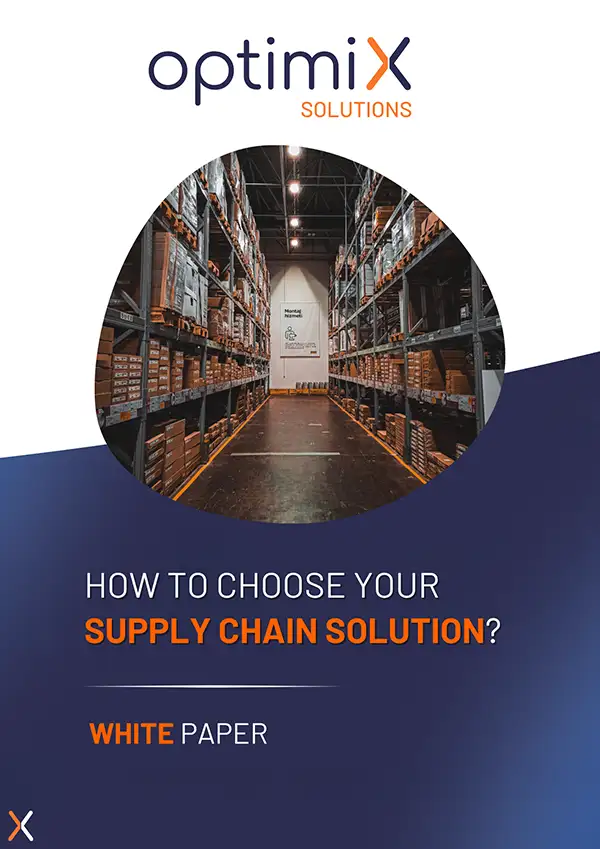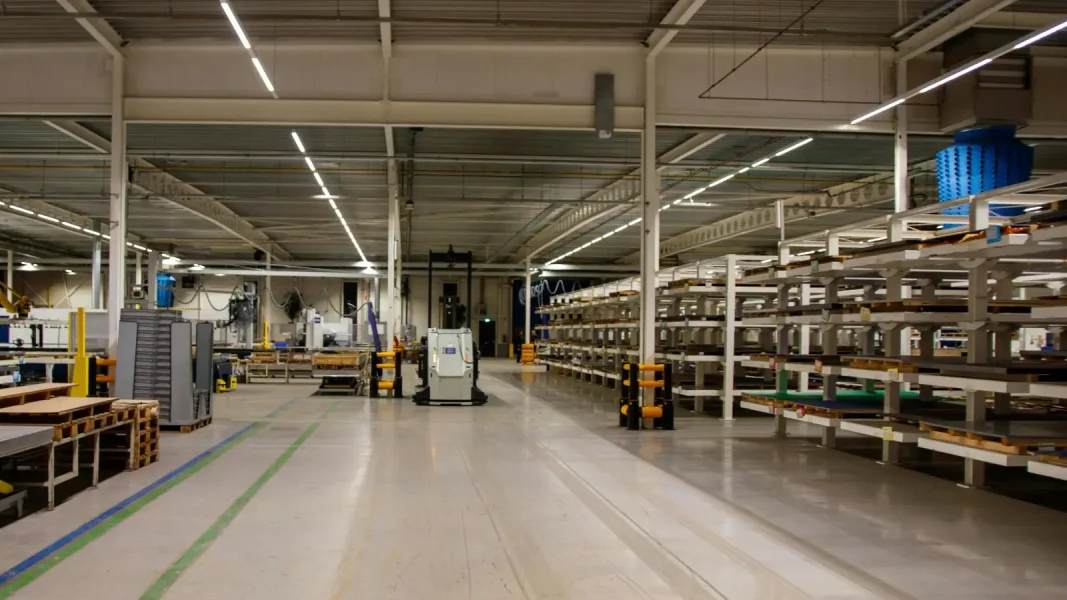Choosing the right supply chain planning and management solution for your business is no easy task, given the multitude of solutions on the market and the complexities of today’s supply chain.
Recent challenges, marked by major delays, breakdowns and upheavals, have severely tested supply chain teams across the globe. To overcome these obstacles, planning has become essential to ensure a robust and flexible supply chain.
Constantly evolving technology has given rise to a mature and highly competitive sector over the past decade. As a result, supply chain professionals have become more demanding in their evaluation of suppliers, favoring those offering holistic and comprehensive planning.
Inventory management: a central element of the supply chain
Supply Chain is more than just an operational process; it symbolizes the fusion of a company’s commercial, logistical and managerial resources to create a powerful and efficient IT tool.
Thanks to e-logistics, it is now possible to integrate and optimize all the company’s operational flows within a single platform. This digitalization of management offers many advantages:
Efficient planning saves time
One of the major advantages of this solution is that it saves a considerable amount of time.
By centralizing and optimizing data, the decision-making process is accelerated, enabling companies to react quickly to market changes or unforeseen events.
This responsiveness is essential in an increasingly competitive business environment.
Financial gains
More precise inventory management limits the costs associated with surplus goods or shortages. Warehouses and storage areas are optimized to ensure better availability of products to meet customer demand.
Implementing a supply chain planning solution in the retail sector can bring a number of financial benefits.
These benefits can vary depending on the size of the company, the complexity of its operations and the way the solution is implemented.
Here are some of the potential financial gains:
Reduce operational costs: Better supply chain planning can help reduce inventory management, logistics and labor costs. By minimizing inefficiencies, you can save money.
Inventory optimization: More precise planning can reduce unnecessary stock levels, while ensuring that products are available when customers need them. This reduces storage costs and interest on tied-up capital.
Improved sales management: Better visibility of customer demand can help anticipate variations in demand and adjust supplies accordingly, reducing lost sales due to stock-outs.
Reduced transport costs: More efficient supply chain planning can help consolidate shipments, reduce transport costs, optimize routes and minimize penalties for delays.
Improved forecast accuracy: A supply chain planning solution can use advanced data and models to improve the accuracy of demand forecasts, enabling better inventory management and reducing the costs associated with overstocking and out-of-stocks.
Better use of sales space: Effective planning can help maximize the use of sales space, ensuring that the most popular products are available and minimizing losses due to poor product layout.
Promotion management : A planning solution can help optimize the planning and execution of promotions, maximizing sales while minimizing associated costs.
Reduced labor costs: Better supply chain planning can optimize staff allocation according to demand, thus reducing labor costs.
Improved customer satisfaction: By having products available when customers need them, and minimizing out-of-stock situations, you can increase customer loyalty and boost sales.
Reduced return costs: Better supply chain management can reduce the number of product returns, saving money in return costs and restocking.
Ultimately, the financial gains from implementing a supply chain planning solution in retail depend on many factors, but they can be substantial in terms of reduced costs and increased profitability.
It’s important to note that the effectiveness of the solution will depend on the quality of the data and how it is implemented, so proper planning and ongoing evaluation are essential to maximize the financial benefits.
These major advantages are all reasons for companies to invest in modern solutions dedicated to the digital transformation of their supply chain.
How to identify a good supply chain planning solution - 5 key tips
1. Choose a highly configurable solution
When you’re looking for supply chain management software, opt for a highly configurable solution. Indeed, each business sector has its own specific features, and each company its own particularities. As a result, it is essential to focus on a tool that meets your planning and operational requirements. This is where configuration capability comes into its own, far beyond simple customization.
An ideal solution is one that allows you to tailor it to your company’s specific needs.. This could mean the ability to customize user interfaces, enabling or disabling certain features depending on the issues you face. The aim is to have a tool that adapts to you, not the other way around.
What’s more, it’s essential that your partner/publisher is able to make modifications or optimizations to the planning environment without having to resort to specific developments.
It’s important to note that, although some publishers offer customized configurations, such approaches can be complicated to maintain and evolve over the long term.
2. Prioritize state-of-the-art solutions
Opting for a solution that evolves regularly is crucial to guaranteeing optimum security for your information systems.. By adopting such an approach, you ensure not only that you benefit from the latest technological advances, but also that you remain compliant with current standards and regulations.
It is also essential to choose a tool with a robust planning strategy, including annual validations of its security level. To be fully effective and impartial, these validations should ideally be entrusted to a specialized external entity, such as a service provider. PASSI qualified – an expert in information systems security audits.
Make sure, too, that your solution offers strict segregation of data by customer, minimizing the risk of leakage and guaranteeing secure planning for every user.
3. Cloud or On-Premise solution: which to choose?
The question of whether to favor a cloud-based or an on-premises planning solution is a complex one, and depends on each company’s particular situation. The key parameters to consider are the company’s existing tools and systems, as well as its specific supply chain requirements.
It’s vital to realize that there is no one-size-fits-all answer when it comes to planning. Each option has its own advantages and disadvantages. So it’s crucial to evaluate these aspects in relation to your current and future planning needs.
Over the years, cloud-based technologies have have experienced considerable growth, benefiting from massive investment and growing adoption by businesses. This trend is not surprising, given the many advantages associated with the cloud. These include faster data processing, better integration between different systems, enhanced security, and greater flexibility and scalability. These features can give your supply chain greater agility, enabling you to optimize your operations.
However, if your company already has an on-premise scheduling solution, the transition to the cloud should not be taken lightly. It’s essential to assess whether such a change would add significant value to your supply chain, and whether the potential benefits justify the necessary investment.
4. Supply chain planning and AI
In today’s digital age, the ability of a planning solution to adapt and anticipate needs is paramount. Artificial intelligence (AI) is at the heart of this evolution. It adds considerable value to supply chain planning, making processes more fluid, predictable and refined. Here are some AI-based features that can revolutionize the way you plan and manage your supply chain:
History anomaly detection
This feature goes beyond simple trend analysis. It identifies unexpected variations or possible historical corrections to be made irregularities in the datasuch as abnormal sales, which could indicate a problem or an opportunity.
Automatic data cleansing
Once anomalies have been detected, it is crucial to have a system capable of correcting or eliminating these erroneous data to maintain the integrity of your information base.
Large-scale forecasts for planning
When you manage a vast inventory and serve a wide range of customers, a tool capable of making historical corrections is essential. for thousands of items is essential. AI can process large amounts of data and provide accurate large-scale forecasts.
Retrospective simulations
Testing the reliability of your forecasts is essential. Being able to simulate scenarios based on past data gives you the confidence to ensure that your models are robust and relevant.
By opting for an AI-integrated planning tool, you’re choosing a solution tailored to modern supply chain requirements. However, an important reminder: AI and algorithms don’t just have to be sophisticated, they must above all be understandable and bring real added value to the user. After all, the aim is not just to automate, but to improve and optimize every stage of the supply chain.
5. support is key
Imagine the following situation: you’ve chosen and integrated a supply chain management and planning solution into your company. Everything works perfectly, until the day an update is needed or an unexpected problem arises. Without proper planning and solid support, your business could face costly and unexpected interruptions.
So it’s vital to partner with a solution provider who understands not only the technical issues, but also the business challenges. you encounter. An ideal technology partner doesn’t just sell you a solution; it makes a long-term commitment to you. He’s with you every step of the way, anticipating future developments and ensuring that the solution evolves in perfect harmony with your company’s changing needs.
So, when looking for the perfect supply chain management solution, don’t just evaluate the software’s functionality. Make sure, too, that your technology partner is there to support you, in good times and bad, always complying with the specific standards and requirements of logistics management.
Find out more about
Boulanger’s experience at Paris Retail Week 2023:
Change management in the face of diversifying competition?
Optimix: Your trusted partner for a high-performance supply chain
Our vision of a successful collaboration is like a “partnership of trust” between Optimix, the software publisher, and you, the customer. This partnership is based on mutual expectations of transparency, collaboration, reliability and support.









